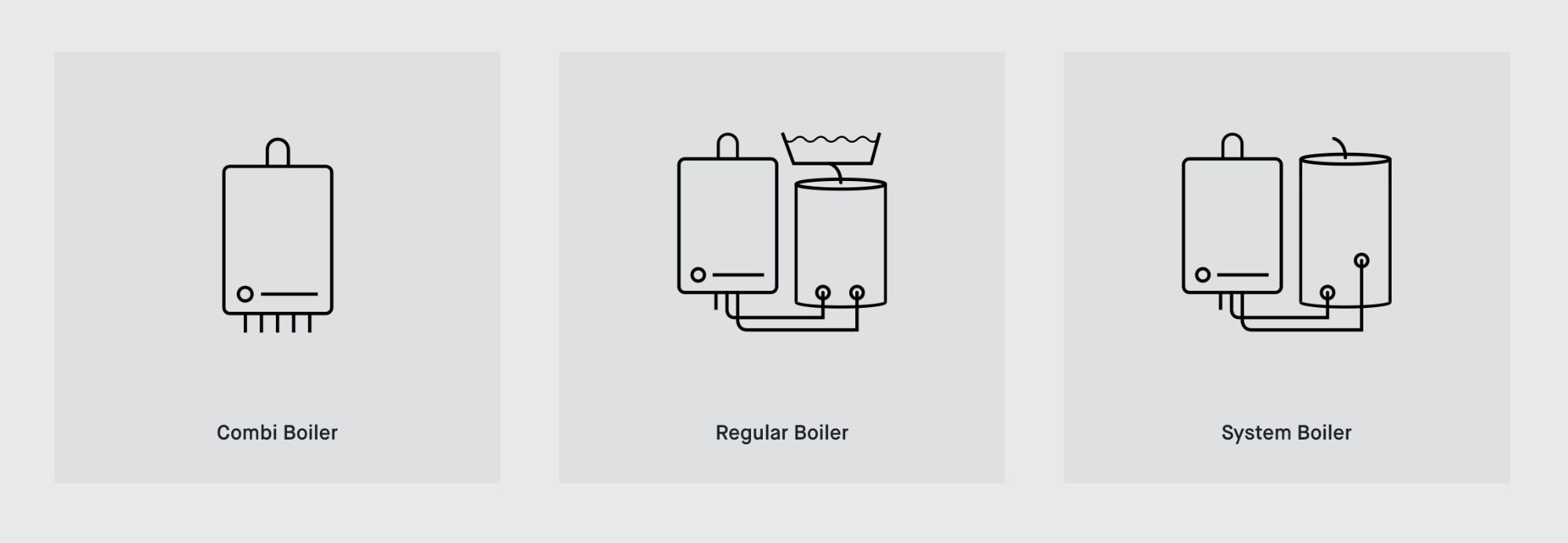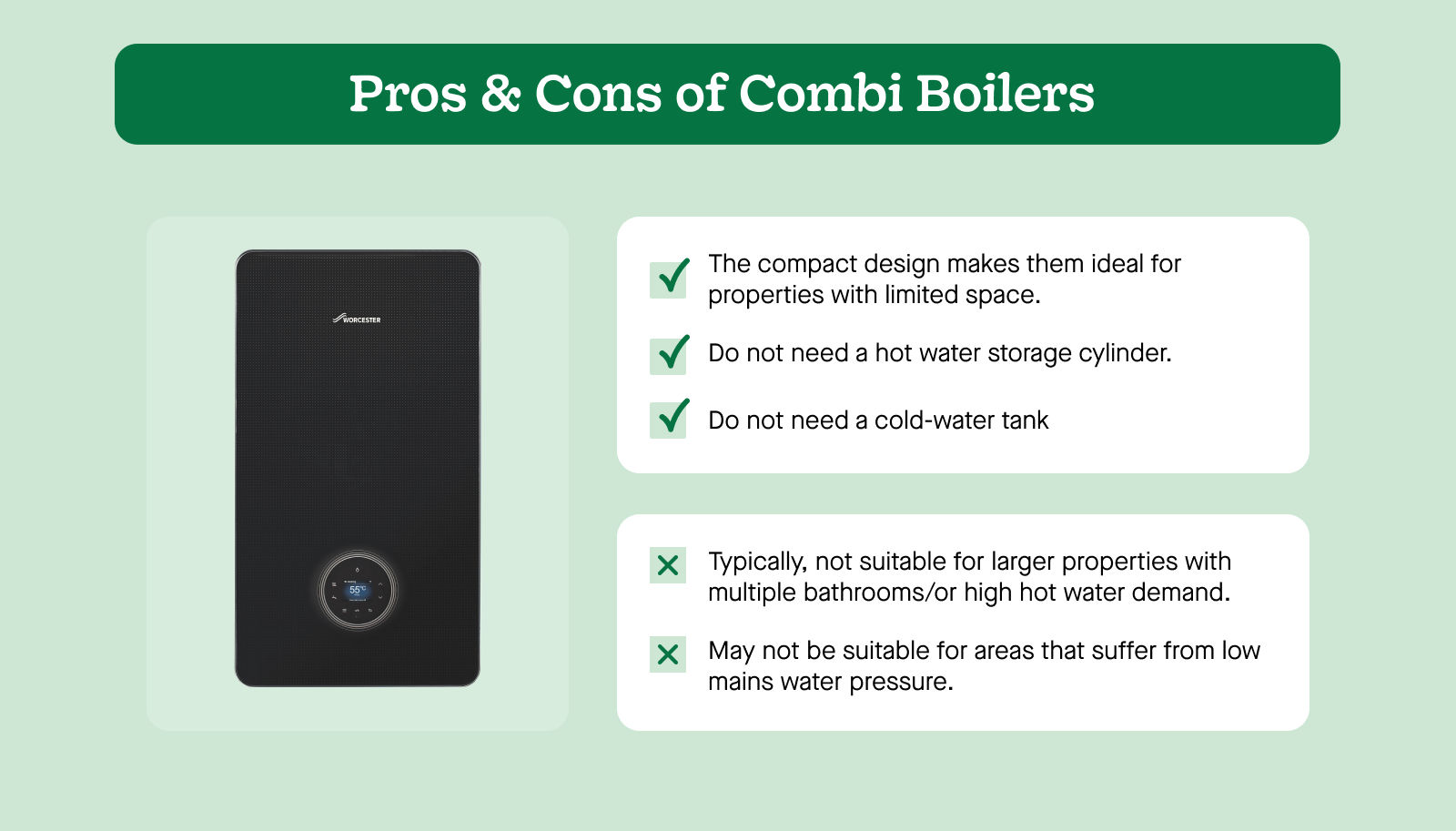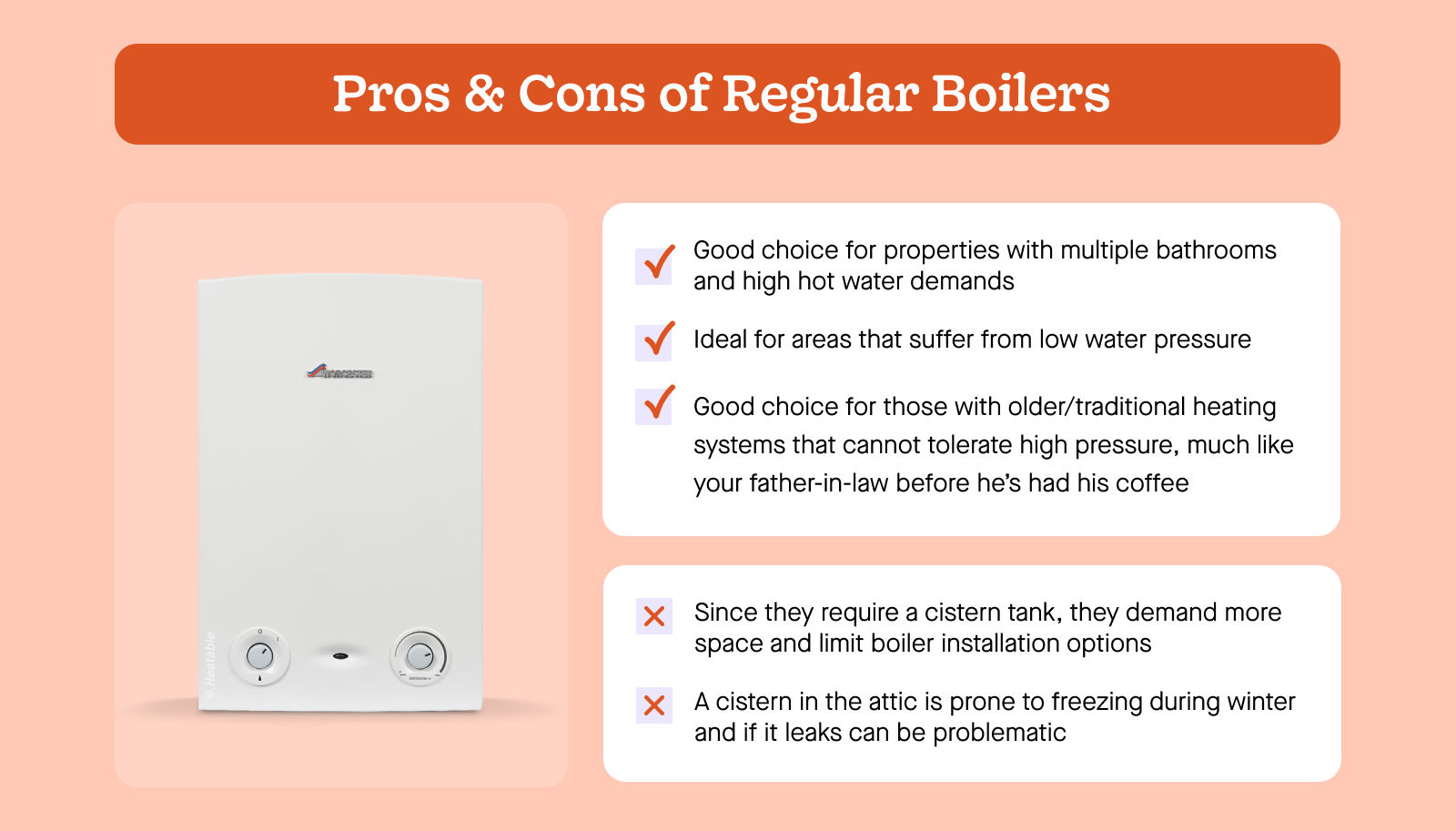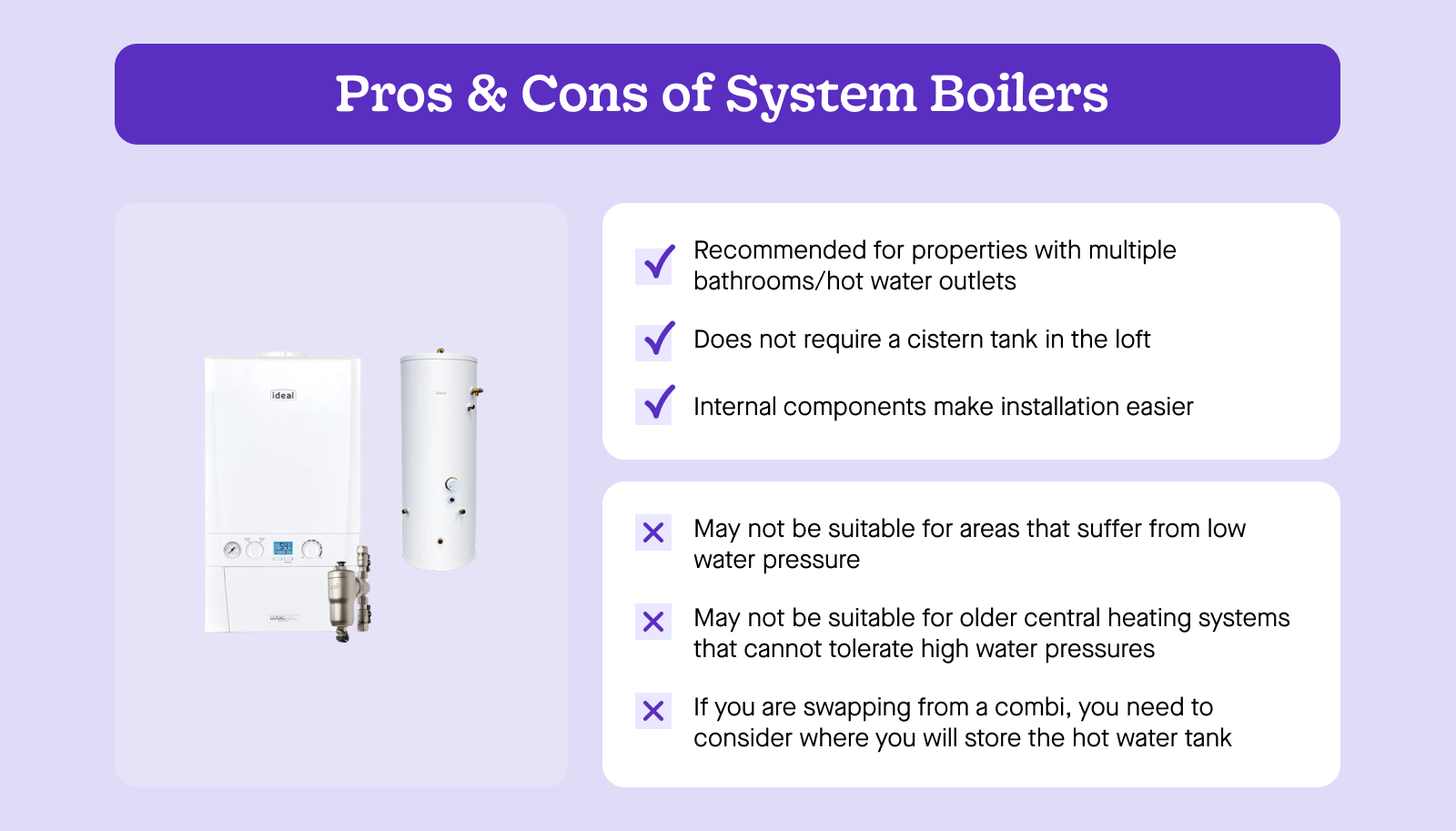Picking the wrong type of boiler is a bad. Not like, picking Ted Bundy as your life partner bad. But still, bad. Clue the eff up on what boiler you have, want and need.
There are three main types of boilers you can install in your home: combi boilers, heat-only (also called regular or conventional boilers) and system boilers. You can’t be too inclusive, here, it’s best to have a type you fancy.
The one most suitable for you and your home largely depends on your current hot water demands, but it is also important to consider other factors, such as the age of your current heating systems and the pressure of your mains water supply.
Should you stay with your current type of boiler? This first draft of what later turned out to be The Clash’s hit is still a relevant question today. Or should you swap to a different type of central heating boiler?
Let’s find out…

Combi Boilers:
A combi boiler provides both your heating and your hot water from a single unit, typically wall-hung.
They're the holy grail of heating and according to Statistica are the UK's most popular type of boiler replacement with a whopping 54% of households owning one by 2019. So what took King Arthur his lifetime, is readily available for you.

So, how do combi boilers work?
Combi boilers utilise a metallic heat exchanger to instantly heat hot water on demand, they achieve this via combustion e.g. by burning fuels such as gas or oil.
This is the biggest distinction between combi boilers, as unlike traditional boilers they do not require a separate hot water storage tank.
Instead, the hot water is heated immediately from a single unit, so you save space for some additional Christmas decorations or an unnecessary hobby.
Learn all about combi boilers in our what is a combi boiler guide and discover which are the best combi boilers in the UK.
Curious to know which boiler brand performed worst? Find out in our report on the worst boilers.
Prefer video? Check out our rundown of the different types of boilers in our video below:
Related combi boiler reading:
Pros of combi boilers
If you are looking for a boiler that's highly energy efficient, a combi (combination) boiler might be the solution. They can be used to heat the home as well as its water, saving you a wedge on heating bills.
Their compact size makes them ideal for even the smallest of properties, and since they use the mains to heat water, you will not have to make space for a cumbersome water tank or cylinder.
Another plus is that because they can instantly heat the water you need; you will not have to wait around for that hot, sultry shower. It’s less time browsing your phone in the bathroom, but quicker hygiene, so that’s a fair tradeoff.
Cons of combi boilers
There are a few drawbacks to consider.
Water flow rates are reduced when two or more outlets are being used at the same time.
So, if you have a larger property with a few bathrooms (which may be used at the same time), a combi might not be the right choice for you. Gordon Ramsay, who’s got five kids and regularly uses his kitchen sink, might want to opt for a different type.
Ultimately, a combi boiler can only heat the water which gets fed to it from the mains. So, if your mains water pressure is low, your combi boiler won't work very well.
Combi boiler key points:
The compact design makes them ideal for properties with limited space.
Do not need a hot water storage cylinder.
Do not need a cold-water tank.
Typically, not suitable for larger properties with multiple bathrooms/or high hot water demand.
May not be suitable for areas that suffer from low mains water pressure.
Looking to pay for your new boiler monthly? Refer to our boiler on finance guide for more info.
Learn all about having a new combi installed in our guide to combi boiler installation and find out what type of boiler you have here.
Heat Only (Regular Boilers):
A heat-only or regular boiler has three main components – the boiler itself, a separate hot water storage cylinder and a cold water storage tank.
The boiler supplies hot water to both the central heating and storage cylinder, so can provide both hot water and heating water.

How do heat-only boilers work?
Regular boilers work by feeding hot water directly to the central heating system i.e. the radiators and storing hot water within a hot water storage cylinder for on-demand use.
Coldwater is supplied to the boiler via a cold-water tank (typically located in the attic/loft), which fills the boiler with the help of gravity. Whether or not Isaac Newton helped invent this part of boiler systems, we don’t know.
Pros of heat-only boilers
Heat-only boilers can provide a greater flow rate and as a result, are more suitable for larger properties with greater hot water demands e.g. those with multiple bathrooms or very dirty children
As they do not require water to be supplied at high pressure via the mains, they are a good option for older heating systems that may not tolerate the high pressure of a closed system. While the law of gravity isn’t always kind to human seniors, it’s almost soothing to an old heating system.
Alternatively, they are also a good choice for areas that have low water pressure mains supplies, which typically struggle to supply adequate water pressure required in combi and system boilers.
Check our new boiler costs guide and use our boiler size calculator if you want to get a better understanding of how our fixed-price boiler quote tool works.
Cons of heat-only boilers
A heat-only boiler may not be compatible with some newer heating systems, and you might have to wait a while for the water to reach the right temperature.
Also, bear in mind that you will need somewhere roomy to store the boiler's cylinder and water tank. If you’ve got your London studio optimized according to the best tiny-space practices of a famous Swedish furniture store, a regular boiler probably isn’t going to work.
Since the cold-water cistern needs to be installed directly above the boiler, this may also limit where you can install the boiler too.
Having issues with your combi boiler? Read our boiler problems and solutions for quick troubleshooting guidance.
Heat-only boiler key points:
Good choice for properties with multiple bathrooms and high hot water demands.
Ideal for areas that suffer from low water pressure.
Good choice for those with older/traditional heating systems that cannot tolerate high pressure, much like your father-in-law before he’s had his coffee.
Since they require a cistern tank, they demand more space and limit boiler installation options.
A cistern in the attic is prone to freezing during winter and if it leaks can be problematic.
Is your boiler leaking or losing pressure? Use our quick and easy tool to get your fixed price boiler replacement.
System Boilers:
System boilers are essentially an upgraded version of the regular or heat-only boiler. They can provide both hot water on demand and heating water for your radiators.

How do system boilers work?
Just like a heat-only boiler, they have a separate hot water tank, except that it is unvented.
All parts such as the pump and expansion vessel are internal too, which also means it does not require a cold-water cistern tank and water is supplied to the boiler via the mains.
Check out our full guide on choosing a boiler for a large home.
Related heating guides:
Pros of system boilers
Just like heat-only boilers, their large hot water storage cylinder means they are ideal for properties with high hot water demands.
Since they have all their components internalised and do not require a cold-water cistern, it means that they do not require as much space as a heat-only boiler. It also means there is more flexibility with the installation location. Now you can have a system boiler as a (hideous) coffee table.
System boilers do not require any components in the attic, it also means that you do not have to worry about any potential leaks or freezing during the winter months.
Considering underfloor heating? Read our complete guide on underfloor heating with a combi boiler.
Cons of system boilers
The hot water flow rate within the home largely depends on the pressure of the main supply, so if it’s low, the flow rate within the home will be limited. For this reason, they are not ideal for places that suffer from low water pressure.
The high-pressure nature of this system means that it may not be suitable for properties with older systems or systems with sensory issues.
System boilers need a hot water storage cylinder so if you are swapping it for a combi boiler, you will need to find adequate storage space.
System boiler key points:
Recommended for properties with multiple bathrooms/hot water outlets.
Does not require a cistern tank in the loft.
Internal components make installation easier.
May not be suitable for areas that suffer from low water pressure.
May not be suitable for older central heating systems that cannot tolerate high water pressures.
If you are swapping from a combi, you need to consider where you will store the hot water tank.
Want to have your boiler moved to a different location? Check out our "cost of moving boiler" guide.
Boiler Type FAQ’s
Are you still curious about some aspects of choosing a new boiler? It’s not surprising for such a complex piece of engineering, here are some of the most frequently asked questions:
What is a condensing boiler?
No matter what type of boiler you are thinking of having installed, the law says that it must be a condensing one.
Most condensing boilers are around 90% energy efficient, can harness excess energy to heat your home, are better for the environment and will help to reduce your heating bills. A few more innovations, and they can walk your dog, too.
Condensing isn't a 'type of boiler' as such, it's more of a technical attribute.
Read all about green boiler options, including condensing boilers.
What size boiler do you need?
When considering boiler size, it typically refers to the boiler’s power output and not the dimensions of the boiler. A boiler's power is measured in kilowatts per hour (kWh), so put simply, the greater the kW, the greater the capacity of the boiler to meet your property's hot water and heating requirements.
Typically, boiler manufacturers will offer their boilers in a range of different sizes. Your boiler installer will determine what size you need from the number of radiators in your house. Make sure to clean your rooms before they come over.
For instance, if you live in a small bungalow, then a small combi boiler is probably going to be recommended. However, if you live in a home with many rooms, all containing radiators, then a large-sized boiler will be required to meet the heating demands.
Want to save money and energy on your heating bills? If so, you should consider installing one of the best smart thermostats.
Types of Boilers Final Words
The type of boiler that is most appropriate for your home will depend on a variety of factors, including your hot water demands, property size and available water pressure.
With that said, the majority of UK homes use gas combi boilers, with regular and system boilers following behind.
Next Steps For Your New Boiler Journey:
When planning to install a new boiler for your home, there are several important factors to consider. Make sure to refer to the following guides to help you make informed decisions:
To dive deeper into these topics, head over to our advice section, or check out our YouTube channel to learn more.
Get a Quote for One of the Best Boilers Today
If you’re aiming to get the best deal on a new boiler, consider getting a quote from us, here’s why:
Gas Safe installation within 24 hours.
Thousands of satisfied customers with an average score of 4.9 on Trustpilot, surpassing the market leader.
Which? Trusted Trader: Heatable is proudly recognised as a Which? Trusted Trader.
Price match guarantee: We will match any like-for-like cheaper quote.
Flexible payment options, including interest-free finance.
Up to 12-year guarantee on selected boilers.
Fixed price guarantee: No hidden costs.
Save your quote and decide later.
Get an instant fixed price on a new boiler, here.
To learn more about boilers, visit our advice section, check out our YouTube channel, or read customer testimonials here.
Heat Happy.






